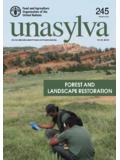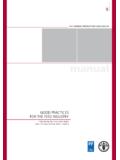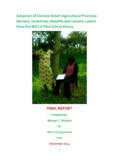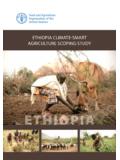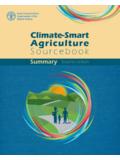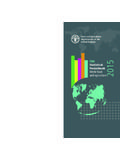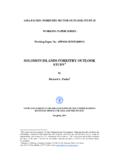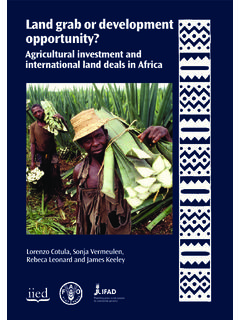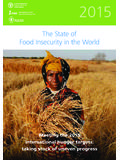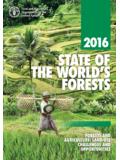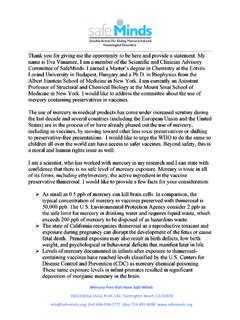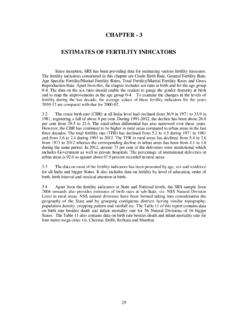Transcription of The State of World Fisheries and Aquaculture - 2012
1 ISSN 1020-5489. THE State OF. World Fisheries . AND Aquaculture . 2012 . Cover photographs courtesy of FAO, O. Barbaroux, G. Bizzarri, Hasan, L. Miuccio, J. Saha, J. Sanders, J. Spaull and J. Van Acker; sidebar photograph courtesy of F. Maimone. Copies of FAO publications can be requested from: SALES AND MARKETING GROUP E-mail: Publishing Policy and Support Branch Fax: (+39) 06 57053360. Of ce of Knowledge Exchange, Research and Extension Web site: FAO, Viale delle Terme di Caracalla 00153 Rome, Italy THE State OF. World Fisheries . AND Aquaculture . 2012 . FAO Fisheries and Aquaculture Department FOOD AND AGRICULTURE ORGANIZATION OF THE UNITED NATIONS. Rome, 2012 . The designations employed and the presentation of material in this information product do not imply the expression of any opinion whatsoever on the part of the Food and Agriculture Organization of the United Nations (FAO) concerning the legal or development status of any country, territory, city or area or of its authorities, or concerning the delimitation of its frontiers or boundaries.
2 The mention of specific companies or products of manufacturers, whether or not these have been patented, does not imply that these have been endorsed or recommended by FAO in preference to others of a similar nature that are not mentioned. The views expressed in this information product are those of the author(s) and do not necessarily reflect the views of FAO. The designations employed and the presentation of material in the map(s). do not imply the expression of any opinion whatsoever on the part of FAO. concerning the legal or constitutional status of any country, territory or sea area, or concerning the delimitation of frontiers. ISBN 978-92-5-107225-7. All rights reserved. FAO encourages reproduction and dissemination of material in this information product.
3 Non-commercial uses will be authorized free of charge, upon request. Reproduction for resale or other commercial purposes, including educational purposes, may incur fees. Applications for permission to reproduce or disseminate FAO copyright materials, and all queries concerning rights and licences, should be addressed by e-mail to or to the Chief, Publishing Policy and Support Branch, Office of Knowledge Exchange, Research and Extension, FAO, Viale delle Terme di Caracalla, 00153 Rome, Italy. FAO 2012 . Foreword Today, the global community faces multiple and interlinked challenges ranging from the impacts of the ongoing financial and economic crisis to greater climate change vulnerabilities and extreme weather events.
4 At the same time, it must also reconcile meeting the pressing food and nutrition needs of a growing population with finite natural resources. This edition of The State of World Fisheries and Aquaculture shows how these issues affect Fisheries and Aquaculture sector and how the sector is attempting to address them in a sustainable manner. Fisheries and Aquaculture make crucial contributions to the World 's well- being and prosperity. In the last five decades, World fish food supply has outpaced global population growth, and today fish constitutes an important source of nutritious food and animal protein for much of the World 's population. In addition, the sector provides livelihoods and income, both directly and indirectly, for a significant share of the World 's population.
5 Fish and fishery products are among the most traded food commodities worldwide, with trade volumes and values reaching new highs in 2011 and expected to carry on rising, with developing countries continuing to account for the bulk of World exports. While capture Fisheries production remains stable, Aquaculture production keeps on expanding. Aquaculture is set to remain one of the fastest-growing animal food-producing sectors and, in the next decade, total production from both capture and Aquaculture will exceed that of beef, pork or poultry. However, in a World in which almost a billion people still suffer from hunger, it is the poor, especially those in rural areas, who are most vulnerable to the combination of threats outlined above.
6 In many areas of sub-Saharan Africa and South Asia, their fish consumption levels remain too low and they are failing to benefit from the contributions that Fisheries and Aquaculture are increasingly making elsewhere in terms of sustainable food security and income. The vital contributions from Fisheries and Aquaculture to global food security and economic growth remain constrained by an array of problems. These include poor governance, weak Fisheries management regimes, conflicts over the use of natural resources, the persistent use of poor fishery and Aquaculture practices, a failure to incorporate the priorities and rights of small-scale fishing communities, and injustices relating to gender discrimination and child labour.
7 The recent United Nations Conference on Sustainable Development, known as Rio+20, discussed these governance-related issues and served as a platform to renew political commitment for sustainable development, assess progress and gaps in the implementation of existing commitments, and address new challenges. Two themes underpinning Rio+20 the institutional framework for sustainable development and the support of a green economy were reflected in FAO's main message that improved management and efficiencies throughout the food value chain can increase food security while using fewer natural resources, achieve more with less. A special focus on oceans and coasts at Rio+20 enabled FAO to voice its recommendations on questions ranging from improving the sustainable use of marine and coastal resources through to poverty eradication, small-scale Fisheries and Aquaculture operations, as well as the potential contribution of small island developing States.
8 Promoting sustainable fishing and fish farming can provide incentives for wider ecosystem stewardship. The greening of Fisheries and Aquaculture requires recognition of their wider societal roles within a comprehensive governance framework. There are several mechanisms to facilitate this transition, including iv adopting an ecosystem approach to Fisheries and Aquaculture with fair and responsible tenure systems to turn resource users into resource stewards. In addition to the efforts of government institutions, enabling Fisheries and Aquaculture to flourish responsibly and sustainably requires the full involvement of civil society and the private sector. Business and industry can help develop technologies and solutions, provide investment and engender positive transformation.
9 Civil society and international and local non-governmental organizations can hold governments accountable on agreed commitments and ensure that the voices of all stakeholders are heard and represented. Efforts to foster good governance for responsible and sustainable Fisheries and Aquaculture should include widespread adoption and implementation of the principles enshrined in the Code of Conduct for Responsible Fisheries , as well as of the provisions of the international guidelines currently under development for securing sustainable small-scale Fisheries . It is also necessary to ensure the uptake and application of relevant international instruments, in particular the 2012 Voluntary Guidelines on the Responsible Governance of Tenure of Land, Fisheries and Forests, and to provide support to initiatives such as the GEF/FAO.
10 Global Sustainable Fisheries Management and Biodiversity Conservation in Areas Beyond National Jurisdiction, the World Bank's Global Partnership for Oceans and the UN Secretary-General's Ocean Compact. To ensure that ecological well-being is compatible with human well-being, and to make long-term sustainable prosperity a reality for all, it is necessary to strike the right balance between seizing opportunities and addressing threats in the use of technology and natural resources, in applying sound economic and policy decisions and in preserving environmental integrity and social licence. It is my sincere hope that this issue of The State of World Fisheries and Aquaculture will serve as a useful reference work on the sector its status, trends, issues and outlook and that it will contribute to a more complete understanding of the sector's key role in shaping our World .
